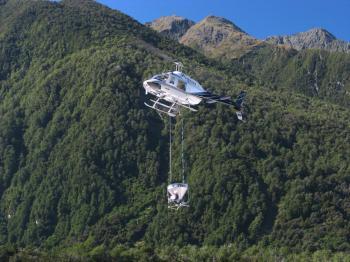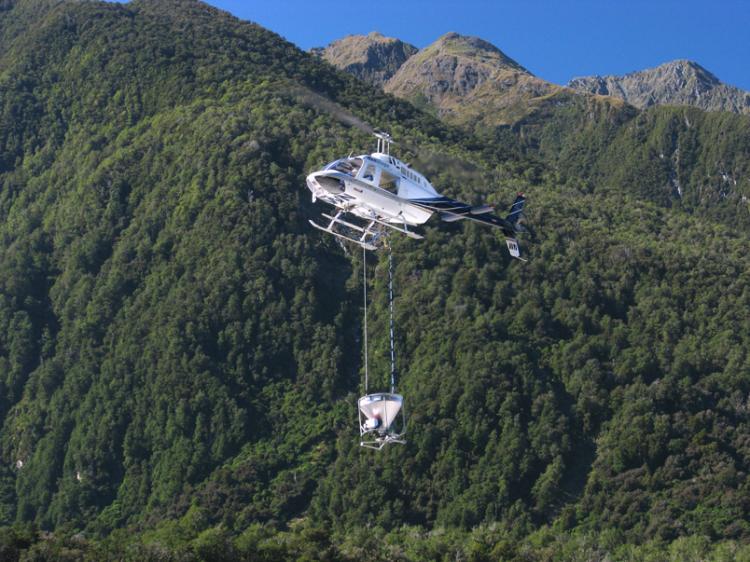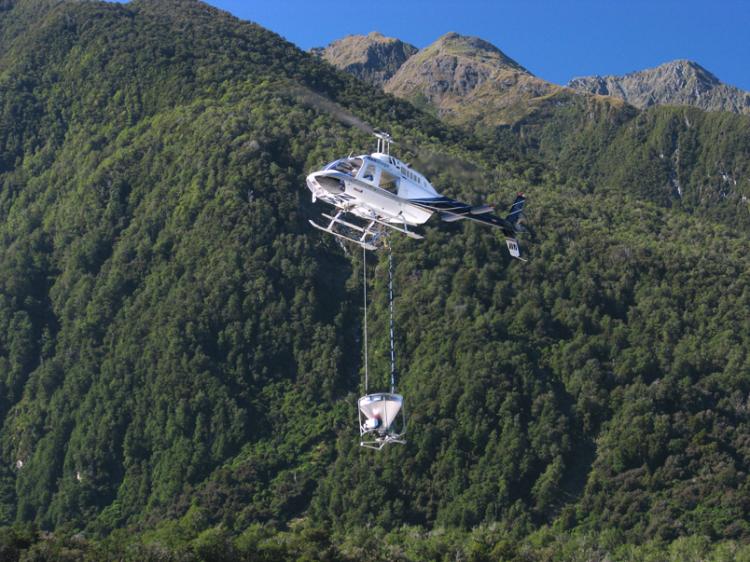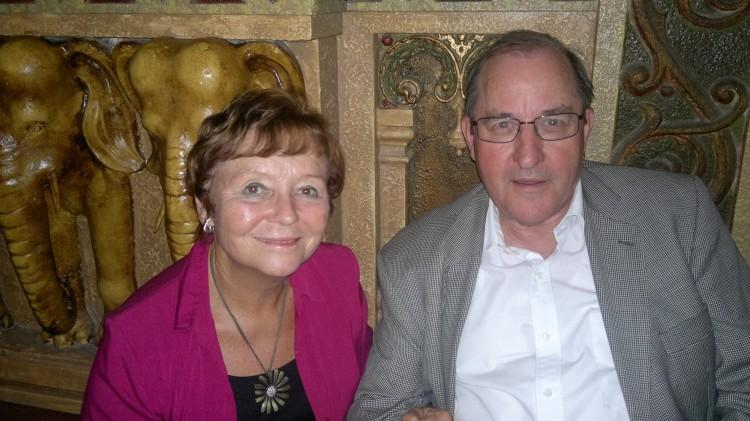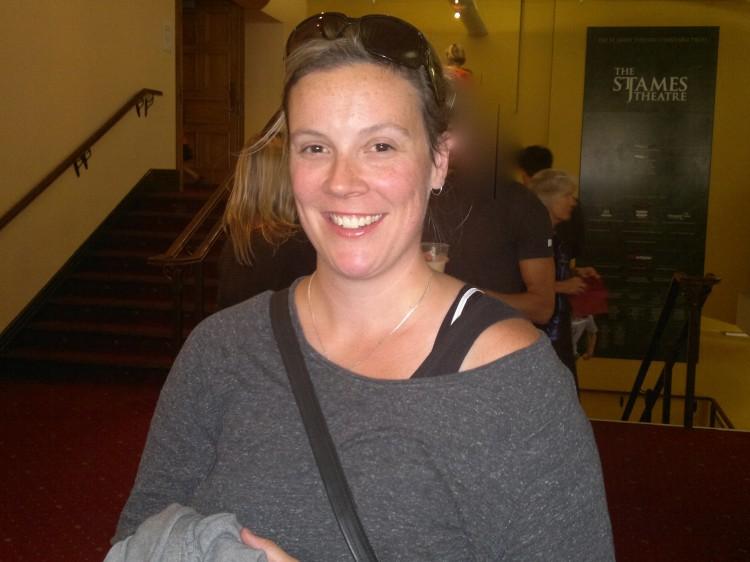AUCKLAND—A new wave of 1080 poison operations carried out in Westland this winter to control possum numbers has again ignited strong emotions amongst local residents and farmers who say that their concerns over the dangers of the toxin are being ignored.
The refusal of government and ‘pseudo-government’ agencies to suspend 1080—sodium monofluroacetate—spraying operations to allow for mediation has ‘gutted’ local residents, says Mrs Molloy, spokesperson for Farmers Against Ten Eighty (FATE).
Both the Department of Conservation and the Animal Health Board (AHB) believe that possums are overwhelmingly responsible for tuberculosis infection in cattle and deer.
A petition for a ban on 1080 poison was signed by 92.5 percent of the people approached in Westland last month and has been accepted by the local government environmental select committee.
Anti-1080 protestors representing FATE, environmental and the Hokitika anti-fluoride Action groups want 1080 replaced by environmentally friendly methods for pest control.
Hari Hari Farmers, Mary and Lindsay Molloy, believe that the toxin poses a risk to the environment and the economy of the region.
The Molloys have lived in Hari Hari for thirty years. Mrs Molloy says that when they arrived there were possums and wild life galore. However, it is now rare to see a possum and native bird life numbers are also extremely low.
Export markets for possum-based petfood, wild venison, timber and bee products have all been affected by use of 1080.
“The wild venison industry was closed overnight by 1080 residues being found in one carcass. The industry has never picked up,” says Mrs Molloy, and the Japanese will only accept possum meat that comes from areas where 1080 poison is not used.
Both aerial spraying and ground control are used but aerial spraying is considered particularly risky.
Aerial spraying from helicopters is not monitored, says Mr Molloy. “GPS (Global Positioning System) is not foolproof. They were flying in the wind the other day dropping pellets from about 500 feet from a hopper on the end of a chain. GPS can only monitor where a helicopter is going— not where the pellets land—particularly if they land in running water.”
Mrs Molloy says there is no evidence showing that TB has been passed from possums to cattle in the area.” ... but some (infection) has come from movement of stock either out for grazing and back in or just making unwise stock movements,(or) buying stock from areas that are not as good as ours.”
AHB chief executive, William McCook agrees that cattle to cattle infection takes place.
“The problem is that we have this huge reservoir of TB infection in wild life and we are really kidding ourselves if we think that just controlling movement is going to fix the problem.”
He says that there is no justification to suspend 1080 operations.
“The proof of safety is partly backed up by the many years of use ... there is very good scientific basis for supporting the use of 1080 as a biodegradable and safe toxin,” he says.
He believes that controlling the prevalence of tuberculosis is vital to to protect New Zealand’s export markets for beef, dairy and other products.
“I disagree very strongly with any claims that 1080 is in any way going to jeopardise export markets—it’s going to be the reverse.”
Aerial spraying using GPS tracking allows the AHB to monitor where the helicopters go and how and where the 1080 pellets drop, he said. The risk of pellets falling in non-targetted areas is very low.
Pest control is carried out over ten million hectares which is one third of New Zealand’s total land mass.
Possum numbers are estimated to have reached 60 million but with pest control are now considerably reduced, says Mr McCook.
According to the World League for the Protection of Animals, 1080 poison is a particularly cruel toxin causing enormous suffering. Death in herbivores can take up to forty-four hours while carnivores can take up to twenty-one hours to die.
The refusal of government and ‘pseudo-government’ agencies to suspend 1080—sodium monofluroacetate—spraying operations to allow for mediation has ‘gutted’ local residents, says Mrs Molloy, spokesperson for Farmers Against Ten Eighty (FATE).
Both the Department of Conservation and the Animal Health Board (AHB) believe that possums are overwhelmingly responsible for tuberculosis infection in cattle and deer.
A petition for a ban on 1080 poison was signed by 92.5 percent of the people approached in Westland last month and has been accepted by the local government environmental select committee.
Anti-1080 protestors representing FATE, environmental and the Hokitika anti-fluoride Action groups want 1080 replaced by environmentally friendly methods for pest control.
Hari Hari Farmers, Mary and Lindsay Molloy, believe that the toxin poses a risk to the environment and the economy of the region.
The Molloys have lived in Hari Hari for thirty years. Mrs Molloy says that when they arrived there were possums and wild life galore. However, it is now rare to see a possum and native bird life numbers are also extremely low.
Export markets for possum-based petfood, wild venison, timber and bee products have all been affected by use of 1080.
“The wild venison industry was closed overnight by 1080 residues being found in one carcass. The industry has never picked up,” says Mrs Molloy, and the Japanese will only accept possum meat that comes from areas where 1080 poison is not used.
Both aerial spraying and ground control are used but aerial spraying is considered particularly risky.
Aerial spraying from helicopters is not monitored, says Mr Molloy. “GPS (Global Positioning System) is not foolproof. They were flying in the wind the other day dropping pellets from about 500 feet from a hopper on the end of a chain. GPS can only monitor where a helicopter is going— not where the pellets land—particularly if they land in running water.”
Mrs Molloy says there is no evidence showing that TB has been passed from possums to cattle in the area.” ... but some (infection) has come from movement of stock either out for grazing and back in or just making unwise stock movements,(or) buying stock from areas that are not as good as ours.”
AHB chief executive, William McCook agrees that cattle to cattle infection takes place.
“The problem is that we have this huge reservoir of TB infection in wild life and we are really kidding ourselves if we think that just controlling movement is going to fix the problem.”
He says that there is no justification to suspend 1080 operations.
“The proof of safety is partly backed up by the many years of use ... there is very good scientific basis for supporting the use of 1080 as a biodegradable and safe toxin,” he says.
He believes that controlling the prevalence of tuberculosis is vital to to protect New Zealand’s export markets for beef, dairy and other products.
“I disagree very strongly with any claims that 1080 is in any way going to jeopardise export markets—it’s going to be the reverse.”
Aerial spraying using GPS tracking allows the AHB to monitor where the helicopters go and how and where the 1080 pellets drop, he said. The risk of pellets falling in non-targetted areas is very low.
Pest control is carried out over ten million hectares which is one third of New Zealand’s total land mass.
Possum numbers are estimated to have reached 60 million but with pest control are now considerably reduced, says Mr McCook.
According to the World League for the Protection of Animals, 1080 poison is a particularly cruel toxin causing enormous suffering. Death in herbivores can take up to forty-four hours while carnivores can take up to twenty-one hours to die.
